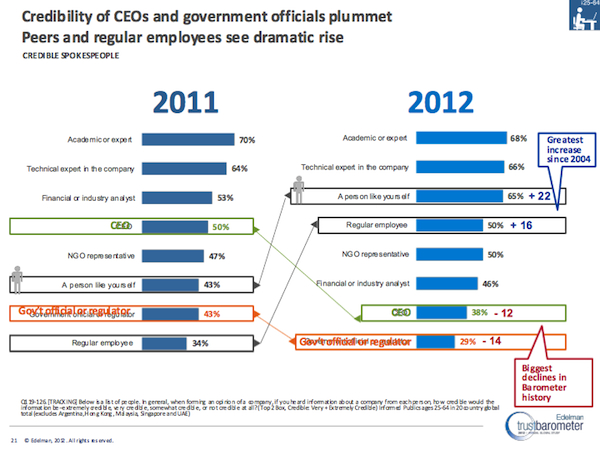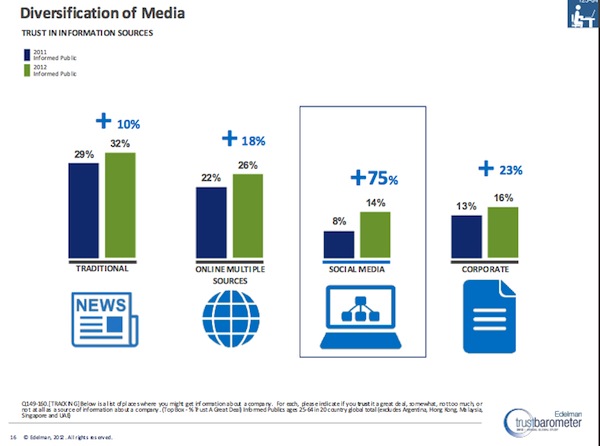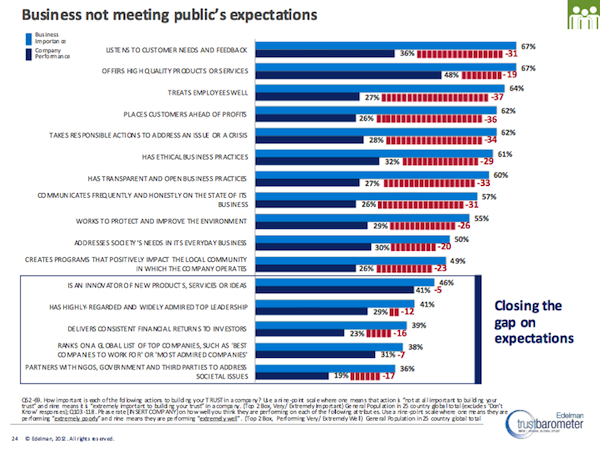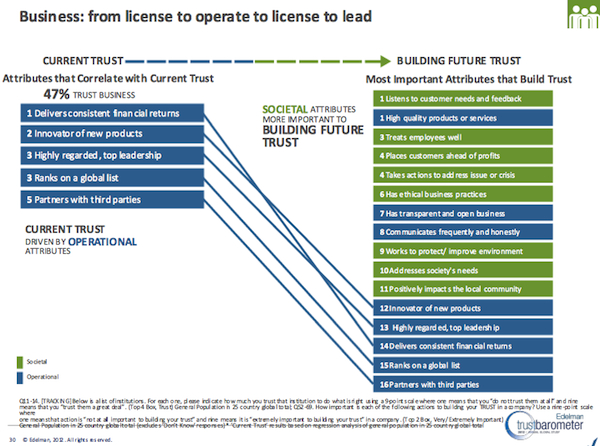“Organizations are no longer built on force, but on trust” – Peter Drucker
“Technique and technology are important, but adding trust is the issue of the decade” – Tom Peters
“Mistrust doubles the cost of doing business” – Professor John Whitney, Columbia Business School
“As you go to work, your top responsibility should be to build trust” – Robert Eckert, CEO, Mattel
“Transcendant values like trust and integrity literally translate into revenue, profits and prosperity” – Patricia Aburdene, Author of Megatrends 2010
————————————————————-
The quotes above were pulled from the book “The Speed of Trust: The One thing that changes everything”.
In the book, Steven M.R. Covey makes the argument with significant validation that establishing trust is the quickest path to success.
The economics of trust are simple
“Trust always affects two outcomes – speed and cost. When trust goes down, speed will also go down and costs will go up. When trust goes up, speed will also go up and costs will go down.”
Ponder that for a minute. In any relationship, personal or business, progress ultimately hinges on this one simple thing. When the presentation is over, when the proposal is offered, when all the due diligence and negotiations have been performed, doesn’t it ultimately rest on whether each side trusts each other to honor their stated obligations?
One could make a strong argument that the maturing customer revolt; the change in customer behavior that is driving the emergence and growth of Social CRM and Social Business has been birthed out of a general distrust of organizations, and institutions in general, for that matter.
Who the world trusts
Since the customer has lost trust in what marketers and sales people say, and since they can’t trust customer service to actually help them in a meaningful and timely way, they have moved instead to solicit 3rd party opinions about the organizations that may have a solution for them. They look to industry experts and peers for opinions, insights, and answers they can trust. This trend is expanding quickly. According to a study from Shopper Sciences, in association with Google “the average shopper used 10.4 sources of information to make a (purchasing) decision, up from just 5.3 sources in 2010.”
Edelman, one of the world’s largest and well recognized global PR firms has produced something called the “Edelman Trust Barometer” for the last several years.
In the 2012 edition, released this week, we see who the general population views as credible spokespeople – people they can trust. We see that ‘Academic or Expert’, ‘Technical expert in the company’, and ‘A person like yourself’ are bunched together in the Top 3. You’ll notice that CEOs and government officials absorbed significant hits to their collective reputation this year.
Another key finding is that social media grew significantly as a trusted information source, gaining ground on traditional media sources.
And in general, customer expectations are woefully short of being met. You’ll see in the graphic below a huge gap between what customers consider as important and how companies are performing in areas like:
- Listens to Customer Needs and Feedback
- Offers High Quality Products or Services
- Places Customers ahead of Profits
- Takes Responsible Actions to Address an Issue or Crisis
Where do we go from here?
The quick take is that TRUST MATTERS. It matters more than we think. As executives, as marketers, as sales people, as customer experience architects, and as customer service personnel, at the core of our job to create trust. Trust is the lubricant that speeds relationships and success, with people, and with organizations.
The key observations are:
– There is a significant trust void between customers and organizations
– People primarily trust experts and people like them
– People solicit lots of different opinions and tap lots of different sources when considering vendors
In the graphic below, survey participants have given us clues on how we can continue to build and deepen trust with our prospects and customers.
How do we do this?
The good folks at 1to1 Media summed it up with this tweet yesterday.
Is it just that simple?
There are a myriad of ways that organizations can respond to create trust. Content marketing, coupled with listening to and engaging customers through social channels are certainly a start. Organizations who do a great job of positioning themselves (and their employees) as experts in their field, and deeply embedding themselves within their respective communities and consistently adding value stand a great chance to do well in this shifting market.
Hiring the right folks, while establishing and nurturing a customer focused culture, and evolving internal and external communication channels and structures are all part of the equation.
The widening customer expectation gap and the pervasiveness of distrust presents a GREAT opportunity for those organizations who are able to respond in a way that resonates with their audience, as they will truly standout.
More resources
(1) Here’s a recent article by Don Peppers titled “The Only Lasting Competitive Advantage is Extreme Trust”
(2) Embedded below is the full 2012 Edelman Trust Barometer Slide Deck
Comments
Trackbacks
-
[…] in not only helping build healthy personal business relationships amongst knowledge workers, but, much more importantly, with customers and business partners. Yet, he brings up some excellent points as to […]
-
[…] Trust is the Foundation of Business […]
-
[…] This is undoubtedly the right direction, and frankly the only direction for corporate survival and growth, in my opinion. A key and often underrepresented component of developing meaningful and profitable customer relationships is TRUST. I’ve written more about that here. […]
-
[…] and alike to prove this. We also know that Customers are more keen to follow advice from close friends, relatives and credible strangers online than from just any company representative. And there’s plenty of evidence that […]





RT @BrianVellmure: Trust: It matters (more than you think) http://t.co/Yu7YEMTr #cmo #scrm #socbiz #sales /good commentary on Trust
RT @BrianVellmure: Trust: It matters (more than you think) http://t.co/Yu7YEMTr #cmo #scrm #socbiz #sales /good commentary on Trust
Thanks Mitch! RT @mjayliebs: RT @BrianVellmure: Trust: It matters (more than you think) http://t.co/7rYC37A8 / Good commentary on Trust
Trust: It matters (more than you think) by @BrianVellmure http://t.co/xuH18e7a via @sameerpatel
RT @oscarberg: Trust: It matters (more than you think) by @BrianVellmure http://t.co/PNo3Hqyx via @sameerpatel #entarch #rbpea
Trust: It matters (more than you think) – good post by @BrianVellmure http://t.co/Rf4EyFfu #socialbiz
Trust: It matters (more than you think) – good post by @BrianVellmure http://t.co/Rf4EyFfu #socialbiz
RT @BrianVellmure: Thx! RT @britopian: Trust: It matters (more than you think) – good post by @BrianVellmure http://t.co/nAEz0jmZ #socialbiz
Trust: It matters (more than you think) http://t.co/2pv34dvi via @MarkW_H
Trust: It matters http://t.co/FFTsSeqq
Trust: It matters http://t.co/H23WQ33d via @wimrampen
Wake up and smell the blog post. Read @BrianVellmure piece on "Trust: It matters more than you think" http://t.co/lXdh4yf7
#WakeUpAndSmellTheBlogPost Read @BrianVellmure piece on "Trust: It matters more than you think" http://t.co/lXdh4yf7
#WakeUpAndSmellTheBlogPost Read @BrianVellmure piece on "Trust: It matters more than you think" http://t.co/lXdh4yf7
@Britopian re: Trust: It matters (more than you think)…by @BrianVellmure http://t.co/UoKTtSaG #socialbiz > Nice work, Brian. #TrustMatters
@Britopian re: Trust: It matters (more than you think)…by @BrianVellmure http://t.co/UoKTtSaG #socialbiz > Nice work, Brian. #TrustMatters
@Britopian re: Trust: It matters (more than you think)…by @BrianVellmure http://t.co/UoKTtSaG #socialbiz > Nice work, Brian. #TrustMatters
RT @brianvellmure: Trust: It matters (more than you think) http://t.co/mrDgXEt9 <hey brian, much talk abt BtoC. Trust even more huge in BtoB
Trust: It matters (more than you think) http://t.co/QjpeuYXh via @bsdalton @BrianVellmure
Thank you for this great insights! I totally agree with your sentence “Trust is the lubricant that speeds relationships and success, with people, and with organizations.” And to answer your question if it was just trust that creates relationships and success: I think that it plays a key role but it is not the only factor. I would like to add that companies need to be transparent but as well flexible and fast enough to anticipate customer needs. The ability to adapt your product to the customer instead of adapting your customers to your product is in my opinion the key to success.
Regards,
Elke
Huge implications for customer data! Trust: It matters (more than you think) – Value Creator (http://t.co/YpFvO8iY) http://t.co/uQM6zNZH
RT @brianvellmure: @pgreenbe referencing concept of trust, and Edelman Trust Barometer – Here's more: http://t.co/pnWGxesn #scon12 #scrm
RT @brianvellmure: @pgreenbe referencing concept of trust, and Edelman Trust Barometer – Here's more: http://t.co/pnWGxesn #scon12 #scrm
I think social media (aka web 2.0) only facilitated something that was always there. Before it used to be word of mouth. No doubt the internet simplified that a lot.
However, as companies start mastering better the social media marketing techniques – and maybe some even use black hat techniques to try fake trust (think: fake reviews, fake likes, fake users posting, sponsored reviews, paid blog entries, etc.), I think the social media will become less black and white, less clear cut, and users will lose trust in it.
web 3.0 anyone?
Brian,
As always, excellently researched and very well written. Bravo.
However, you knew this was coming – right, you are making a gigantic assumption here, which i think is what is holding us back in your pursuit of finding value out of social media: you assume that customers want to trust companies. And, by definition, the other way around. This, to me, is the same assumption that people want relationships with companies. Far from it, at least on this count — and the jury is still out on whether companies want to trust customers, and if customers want to trust companies.
Sure, we want to know that the products or services we get are well done or made, that they are priced appropriately, and that we are getting the best deal/solution we can. But, can’t we accomplish that without trusting the vendors/companies?
That is where the “trust someone like yourself” comes in. We know that others are like us, untrusting towards companies, just buying products and services either as early adopters with opinions (which is where the word of mouth truly originates) or relying on someone else’s opinions. The “opinion formers” are what we call “influencers” (for lack of a better word), but they are also the ones that make or break the product: without the first few positive reviews, no product or service would ever move forward.
So, the question – once again: do we want to trust companies? or do we want to trust people like ourselves with an opinion?
If number two, then the last part of your post about being open and transparent and emotional (my word) as a company is not the right thing: spend the money in wooing the “opinion makers” that get the ball rolling, and they truly honestly are not in it for trust – they are in it for the experience, for the prestige of being first, for the recognition of their “prowess”.
Trust is an overplayed human emotion that has not place in commerce. The other word that is circulating these days, which is basically trust’s cousin is engagement — but that is fodder for another post or place.
Bottom line: trust is like loyalty — truly, honestly does not exist or is needed. What we need is an honest provider that sets out to do things right, a few opinion formers that recognize and reward that, and momentum (helped by tons of marketing dollars) to get the ball rolling. After that, just wait for gravity to do its thing.
Don’t you think?
Esteban
Thanks for sharing your thoughts.
Fundamentally, I disagree that trust has no place in commerce. It fuels commerce. I could also make an argument that in Latin cultures, this is even more true. Since you know Latin America better than me, I am especially interested in your opinion here.
People do business with people they like and people they trust. In the consumer world, you could arguably substitute brands for people in the sentence above.
Distrust slows commerce down, and we see this over and over again. Companies are simply entities that are made of people. The sum of interactions with a company are either directly with people or with content/automated interfaces that have been created by people.
Some personal examples:
Example 1: If my clients want to speak with an analyst who can provide sound customer strategy analysis and input, I’ll recommend you. Why? Because I trust you. The trust has built over time through personal interactions with you, validation by 3rd parties that I know, and some that I don’t. My clients will trust me because they’ve worked with me, know me, and understand the level of quality me and my network offers.
In the absence of these threads of trust, costly due diligence, doubt, fear enter into the picture and stand starkly in the way of commerce, potentially eliminating it entirely and adding costs.
Example 2: When Trader Joe’s offers a killer deal on a rare bottle of wine, I’ll trust it with limited due diligence. Why? Because Trader Joe’s has done a great job of curating great priced bottles of wine and selectively promoting and pricing wine that has consistently met or exceeded expectations. Simply put, I trust that when they present something, it’s trustworthy.
Example 3: Trust (and customer experience) continues to bring me back to Nordstrom. (1) They do a great job of curating great products. (2) They offer a superior experience. I’ve received hand written thank you cards – personal phone calls, and other things that I have never experienced from any other retail store. (3) They will take anything back, after any amount of time. No questions asked. I trust their taste. I trust their judgement in hiring great people. I trust that they will make it right if I ever have an issue (because I and others have experienced it).
Bad experience is a result of broken promises and missed expectations. Broken promises and missed expectation erode and destroy trust, period. It really doesn’t matter whether this is with a person, a brand, an organization, or any other institution.
Don’t you think? 🙂
RE: @brianvellmure Brian,
As always, excellently researched and very well written. Bravo.
However, you knew this wa… http://t.co/We76Ip6M
Hey Brian,
I read your post last week. But this study, about which I wrote a post yesterday, prompted me to come back and ask your opinion…and maybe Esteban and others since they’re here.
http://www.brandfog.com/CEOSocialMediaSurvey/BRANDfog_2012_CEO_Survey.pdf
The point is that trustworthiness a core value. Trust is earned from customers via every decision made and action taken by a company. This survey seems to indicated that CEOs and other corporate leaders that personally participate in sm enhance their company’s/brand’s trust quotient. I say hogwash. The Temkin Group recently published their survey of most trusted companies. I’m looking at the correlation there and will write on that.
But, to your post, the 1to1 group is seeming to suggest a similar causal relationship. I don’t agree. While it’s true social media provides a vehicle for companies to demonstrate integrity, honesty and other trustworthy characteristics which already pre-exists, the mere participation in social media does neither create or insure transparency. Nor does it demonstrate trustworthiness.
I’d appreciate your thoughts.
Insightful as always.
Thanks
Barry
Barry,
I think we’re in agreement here.
While trust is the critical component under review, a big question remains as to social media’s role in helping to establish and nurture trust between individuals, organizations, and other institutions.
My personal view is that typically social media is simply an onramp to more meaningful interactions. In other words, it’s “interaction lite”. It’s one channel of interaction and while it has its benefits – reach and speed, in my experience, most meaningful interactions are taking place on other channels.
While social interactions may be a corroborative marker for trust, the establishment of trust hinges on a myriad of other things – most notably does the words or expectations set by a brand align with or is surpassed by the experience of the customer (or partner, supplier, investor, or other stakeholder).
Stepping away from social media for a moment, there are certain markers within organizations where trust runs high – things like transparency, open communication and collaboration, authenticity, accountability, empowerment, loyalty, etc. These markers can all exist within a corporate culture with or without social media. Social media (including internal collaboration tools, customer communities, etc. etc.) may help to enable and support a culture that values, encourages, and establishes trust internally and externally, but to say that participation on social media has a causal effect to deeper trust borders on the ridiculous in my mind. It’s the content and nature of the interactions that are the secret sauce, not the channel on which they are exchanged.
Regarding the report, I’d be very interested in seeing more details about the survey population. At first pass, it seems like a bunch of rah-rah with self-serving and inaccurate conclusions.
thanks for your insight. I thought the same thing about the survey population. Employees commenting about their own company executives. Where were the customers? thanks again.
MT @BrianVellmure: an interesting debate on trust w @ekolsky http://t.co/s8CZB7WI | I do not know who to trust on this one…
“@mjayliebs: MT @BrianVellmure: an interesting debate on trust w @ekolsky http://t.co/v02Jb6DR | I do not know who to trust on this one…”
“@mjayliebs: MT @BrianVellmure: an interesting debate on trust w @ekolsky http://t.co/PQ7zxmYs | I do not know who to trust on this one…”
Do CEO's really need to participate on social media to establish trust? @bsdalton asks an important question here http://t.co/2eVOHIwO #scrm
Do CEO's really need to participate on social media to establish trust? @bsdalton asks an important question here http://t.co/2eVOHIwO #scrm
@BrianVellmure "causal effect borders on ridiculous" – brilliant. Spot on Brian. http://t.co/HLvpUwpT #scrm
RT @brianvellmure: "Customers no longer trust vendors. They trust each other" – Anthony Lye. research shows: http://t.co/baS9n64k #CRMe12
RT @BrianVellmure: "Customers no longer trust vendors. They trust each other" – Anthony Lye. Research shows: http://t.co/WpcsetL8 #CRMe12
RT @brianvellmure: "Customers no longer trust vendors. They trust each other" – Anthony Lye. research shows: http://t.co/baS9n64k #CRMe12
"Customers no longer trust vendors. They trust each other" – Anthony Lye. Here's what research shows: http://t.co/0qwxSseZ #CRMe12 #strategy